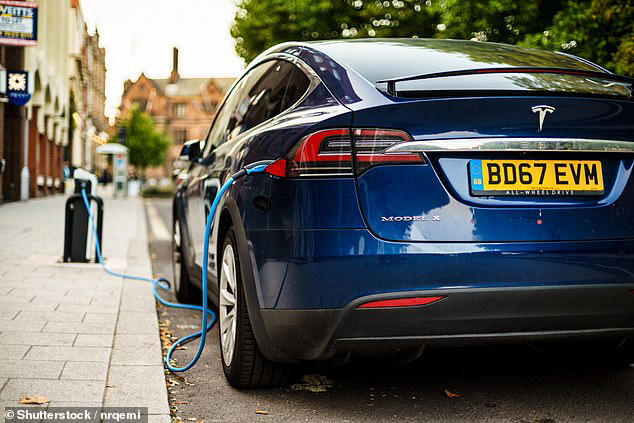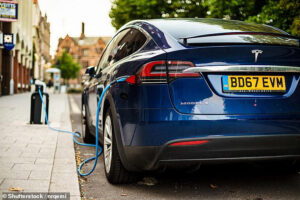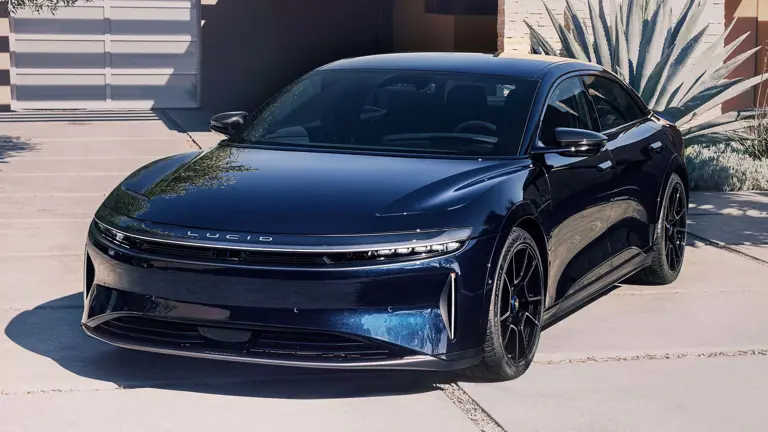Tech
Electric cars now MORE reliable than petrol and diesel counterparts
Published
2 months agoon
By
Ekwutos Blog
Electric vehicle (EVs) sales have slumped in Britain, with the public struggling to fall in love with the technology.
A shortage of public chargers fuels ‘range anxiety’ among motorists worried about where they can top up their batteries, while high prices have also put off would-be buyers.
Despite these fears, a new study claims that EVs are even more reliable than traditional cars and vans with petrol and diesel engines.
Researchers from the University of Birminghamand the London School of Economics (LSE), analysed the ‘health’ of nearly 300 million vehicles on UK roads.
Their analysis found that battery electric vehicles (BEVs) not only had a lower likelihood of failure, but also a comparable lifespan to traditional cars and vans.
According to the team, this marks a ‘pivotal moment in the drive towards sustainable transportation’.
Co-author Dr Viet Nguyen-Tien, from the LSE, said: ‘Our findings provide critical insights into the lifespan and environmental impact of electric vehicles.
‘No longer just a niche option, BEVs are a viable and sustainable alternative to traditional vehicles – a significant step towards achieving a net-zero carbon future.’

A new study claims that EVs are even more reliable than traditional cars and vans with petrol and diesel engines

Their analysis found that battery electric vehicles (BEVs) not only had a lower likelihood of failure, but also a comparable lifespan to traditional cars and vans
In the study, the team used nearly 300 million UK Ministry of Transport test records to analyse UK vehicles from 2005 to 2022.
This allowed them to estimate the reliability and longevity of each vehicle.
Their analysis revealed that BEVs demonstrated the most rapid improvement in reliability, with a 12 per cent lower likelihood of failure for each successive year of production.
For comparison, these figures were only 6.7 per cent and 1.9 per cent for petrol and diesel vehicles, respectively.
In addition, the results revealed that BEVs now have an average lifespan of 18.4 years and can travel up to 124,000 miles.
Petrol cars have a slightly longer average lifespan of 18.7 years, but with a lower mileage of 116,000 miles.
Meanwhile, diesel cars have a higher mileage (159,000 miles), but a shorter lifespan of 16.3 years.
As part of the study, the team also identified the top-performing brands in terms of vehicle longevity.

In the study, the team used nearly 300 million UK Ministry of Transport test records to analyse UK vehicles from 2005 to 2022 (stock image)

EVs have lower greenhouse gas emissions overall when compared with conventional cars, but there are some hidden environmental costs of an electric car
Among BEVs, Tesla leads the charge, while Audi is the best performer for petrol, and Skoda is the top for diesel.
‘BEVs offer significant environmental benefits, especially as Europe switches to a more renewable energy mix,’ said study co-author Robert Elliott, Professor of Economics at the University of Birmingham.
‘Despite higher initial emissions from production, a long-lasting electric vehicle can quickly offset its carbon footprint, contributing to the fight against climate change – making them a more sustainable long-term option.
‘Our findings offer consumers reliable data to make informed decisions about their vehicle purchases, whilst policymakers can use our insights to shape regulations and incentives that promote the adoption of durable and environmentally friendly vehicles and plan ahead their end-of-life treatment.’
However, the study comes as sales of electric cars have slowed in Britain.
A shortage of public chargers fuels ‘range anxiety’ among motorists worried about where they can top up their batteries, while high prices have also put off would-be buyers.
Electric vehicles run on energy from a charged battery much like a smartphone but come with hefty pricetags – around £46,000 on average in the UK.
‘Electric vehicles typically cost more upfront,’ say Milad Haghani, lecturer in urban analytics at UNSW Sydney, and Hadi Ghaderi, a supply chain professor at Swinburne University of Technology, in a piece for The Conversation.

Their analysis revealed that BEVs demonstrated the most rapid improvement in reliability, with a 12 per cent lower likelihood of failure for each successive year of production. For comparison, these figures were only 6.7 per cent and 1.9 per cent for petrol and diesel vehicles, respectively
‘Sales have slowed in parts of Europe and the United States often due to reduced incentives, but strong sales growth continues in other regions such as China and India.’
The two experts say a ‘flood of cheaper Chinese vehicles’ is lowering the cost barrier.
However, these Eastern exports have triggered surveillance fears.
Another ‘major issue’ for car buyers is uncertainty about an electric model’s resale value compared to a standard petrol or diesel, the researchers point out.
‘Consumers are concerned electric vehicles depreciate faster than traditional cars… these concerns are particularly tied to battery degradation, which affects a car’s range and performance over time.’
Meanwhile, EV fires have made headlines globally – including a high-profile battery fire in a Korean parking lot in August – creating doubts among consumers.

You may like


Federal High Court in Abuja has set April 10 as the date to hear a case asking for the removal of Vice Admiral Ibok-Ete Ekwe Ibas as Sole Administrator of Rivers State.


Anambra 2025: Labour Party suspends guber primary indefinitely.


Minister of Education, Dr Tunji Alausa Advocates Extension Of NYSC Scheme To Two Years


Zinoleesky Welcomes New Addition to His Family


Renowned Bauchi cleric, Abdulaziz Dutsen Tanshi is dead


Tourists lament cancellation of 2025 Eid-el-Fitr Durbar in Kano
Tech
The 50-year-old code that reshaped the world: Bill Gates on the ‘revolution’ that started Microsoft
Published
1 day agoon
April 4, 2025By
Ekwutos Blog
Even as he grows older, Microsoft founder Bill Gates still fondly remembers the catalytic computer code he wrote 50 years ago that opened up a new frontier in technology.
Although the code that Gates printed out on a teletype machine may look crude compared to what’s powering today’s artificial intelligence (AI) platforms, it played a critical role in creating Microsoft in April 1975 – a golden anniversary that the Redmond, Washington, company will celebrate on Friday.
Gates, 69, set the stage for that jubilee with a blog post reminiscing on how he and his old high school friend – the late Paul Allen – scrambled to create the world’s first “software factory” after reading an article in the January 1975 issue of Popular Electronics magazine about the Altair 8800, a minicomputer that would be powered by a tiny chip made by the then-obscure technology company, Intel.
The article inspired Gates, who was just a freshman at Harvard University, and Allen to call Altair’s maker, Micro Instrumentation and Telemetry Systems, and promise the company’s CEO Ed Roberts they had developed software that would enable consumers to control the hardware.
There was just one hitch: Gates and Allen hadn’t yet come up with the code they promised Roberts.
‘The coolest code I’ve ever written’
Gates and Allen tackled the challenge by latching onto the BASIC computer language that had been developed in 1964 at Dartmouth College, but they still had to figure out a way to make the technology compatible with the forthcoming Altair computer, even though they didn’t even have a prototype of the machine.
After spending two months working on the program with little sleep, Gates finished the code that became the basis for the Altair’s first operating system.
“That code remains the coolest I’ve ever written,” Gates wrote in his blog post, which includes an option to download the original programme.
The code would go on to provide the foundation for a business that would make personal computers a household staple, with a suite of software that includes the Word, Excel, and PowerPoint programs, as well as the Windows operating system that still powers most PCs today.
“That was the revolution,” Gates said of the code in a video accompanying his post. “That was the thing that ushered in personal computing”.
Gates’ recollection of the code is part of a nostalgic kick that he has been on this year as he prepares to turn 70 in October.
The trip down memory lane included the February release of a memoir exploring his early years as an often-misunderstood child with few friends and a hailing of the 25th anniversary of the philanthropic foundation he created after stepping down as Microsoft’s CEO in 2000.
The tech giant initially stumbled after Gates’ departure but has been thriving under CEO Satya Nadella, and has amassed a market value of about $2.8 trillion (€2.5 trillion).
In his memoir, Gates also reflected on his tempestuous relationship with fellow PC pioneer, the late Apple co-founder Steve Jobs, whose company will be celebrating its golden anniversary next year.
“Fifty years is a long time,” said Gates, whose personal fortune is estimated at $108 billion (€98 billion). “It’s crazy that the dream came true”.
Tech
Lucid Had Another Record Quarter Thanks To Tesla Owners Who Jumped Ship
Published
2 days agoon
April 3, 2025By
Ekwutos Blog
The American luxury EV maker had its fifth consecutive record quarter.
- Lucid Motors delivered 3,109 cars in the first quarter.
- That’s a 28% increase year-over-year.
- A big reason for the uptick? Tesla owners.
The Lucid Air is a phenomenal machine, albeit a very expensive one. It’s the longest-range electric vehicle on sale today, with up to 512 miles on a full charge. It’s also extremely comfortable, but it costs between $70,000 and $250,000.
Despite the high price tag, the Air just helped Lucid achieve its fifth consecutive record quarter for deliveries. Thanks in no small part to Tesla owners ditching their EVs for other battery-powered cars, Lucid delivered 3,109 units in the first quarter of this year–an impressive increase of 28% over last year.
“Tesla owners always have been a source of customers for us,” said Lucid’s Interim CEO Marc Winterhoff during a Fox Business interview last week. “We saw a dramatic uptick in the last two months. Right now, 50% of all the orders that we have are from Tesla owners.”
More Lucid Stories
Compared to last year’s fourth quarter, Lucid delivered just 10 more vehicles, but a record is still a record. When it comes to manufacturing, the California-based startup built 2,213 cars at its facility in Casa Grande, Arizona, with an additional 600 units in transit to Saudi Arabia, where they will be assembled at the company’s AMP-2 facility. Compared to Q1 2024, Lucid built 28% more cars in the first quarter of this year.
Deliveries of the new Gravity SUV are yet to begin, with the first demo units scheduled to be finalized by the end of April. As a reminder, Lucid also built a handful of Gravity SUVs late last year, but that was a limited run intended for employees and company friends. In other words, although Lucid doesn’t split the delivery numbers for its two models, all the cars delivered in Q1 were likely Air sedans.
With the Gravity, Lucid is broadening its appeal to a wider audience that may not be so convinced about a luxury electric sedan. “More than 75% of our Gravity orders are from people who don’t own a Lucid,” said Winterhoff. That said, don’t expect Lucid’s first SUV to be affordable. The Gravity Grand Touring starts at $94,900–this gets you up to 450 miles of range on a full charge and seating for up to seven adults. A cheaper Touring trin, which will start from $79,900, will go on sale in late 2025.
Lucid Motors Deliveries
| Period | Units Delivered |
| Q4 2022 | 1,932 |
| Q1 2023 | 1,406 |
| Q2 2023 | 1,404 |
| Q3 2023 | 1,457 |
| Q4 2023 | 1,734 |
| Q1 2024 | 1,967 |
| Q2 2024 | 2,394 |
| Q3 2024 | 2,781 |
| Q4 2024 | 3,099 |
| Q1 2025 | 3,109 |
Tech
Ford’s EV, Hybrid Sales Surge In Q1 Ahead Of Tariff Chaos
Published
2 days agoon
April 3, 2025By
Ekwutos Blog
It was a record start to the year for electrified vehicles, mainly led by the Mustang Mach-E. But that could get pricier soon.
- Ford sold 73,623 electrified models in the U.S. in the first quarter, a 26% year-over-year growth.
- It was a record start to the year for hybrids, up 33% while Ford’s EVs were up 12%, mainly led by the Mustang Mach-E.
- Deliveries of the 2025 Mustang Mach-E, with improved range and more features, is imminent. But it could cost substantially more with President Trump’s 25% tariffs.
Ford sold more than half a million vehicles in the U.S. across powertrain types in the first quarter of this year.
While its overall sales sank marginally, electrified vehicles grew 26% year-over-year. Hybrids, plug-in hybrids and fully electric models now together account for 15% of Ford’s overall sales, a 3% jump over last year.
The Dearborn automaker sold 501,291 units in the first quarter, a 1.3% year-over-year drop. Gas-powered vehicles accounted for 427,668 units (85%) of the total sales, whereas fully electric models made up 22,550 units (4.4%) and hybrids totaled 51,073 units (10.1%).

2025 Mustang Mach-E Rally_04
The Mustang Mach-E outsold the gas-powered Mustang again and every single Lincoln model on sale. Ford sold 11,607 Mach-Es, a 21% increase year-over-year. By comparison, buyers drove home only 9,377 combustion-engined Mustangs, a sharp 31.6% drop.
Sales of the E-Transit electric van increased nearly 30% to 3,756 units. However, the F-150 Lightningdid not perform as well, even though the overall F-Series trucks grew by 24.5%. Only 7,187 Lightnings found homes so far this year, a 7.1% drop.
By comparison, sales of the Chevy Silverado EVgrew 125% to 2,383 units. General Motors also just launched cheaper versions of the 2026 Sierra EV, which has the potential to put the automaker at the forefront of the electric truck race in the coming months.
However, Ford’s momentum with its electrified models risks stalling as President Trump’s 25% tariffs on imported cars and auto parts went into effect on Wednesday. While most Ford cars are assembled in the U.S., all of them get over half of their parts content from overseas—mostly Mexico—according to the National Highway Traffic Safety Administration.

2025 Ford F-150 Lightning with the
A whopping 78% of the Mustang Mach-E’s parts are sourced from Mexico and the crossover is also assembled there. Even the hugely popular Bronco Sport and the Maverick are assembled across America’s southern border.
Unless the president provides American automakers with some tariff relief or trade concessions, their momentum risks getting wiped out, at least in the short term.
Have a tip? Contact the author: suvrat.kothari@insideevs.com
Related Stories

25 YEAR OLD FASHION DESIGNER ALLEGEDLY POISONED BY HIS GIRLFRIEND AT MARINE BASE, PORT HARCOURT

Chelsea ‘breach UEFA limits on financial losses’, could be banned from Europe

Federal High Court in Abuja has set April 10 as the date to hear a case asking for the removal of Vice Admiral Ibok-Ete Ekwe Ibas as Sole Administrator of Rivers State.
Trending

 Trending6 months ago
Trending6 months agoNYA demands release of ‘abducted’ Imo chairman, preaches good governance
- Business6 months ago
US court acquits Air Peace boss, slams Mayfield $4000 fine

 Politics6 months ago
Politics6 months agoMexico’s new president causes concern just weeks before the US elections
- Entertainment6 months ago
Bobrisky transferred from Immigration to FCID, spends night behind bars
- Entertainment5 months ago
Bobrisky falls ill in police custody, rushed to hospital

 Politics5 months ago
Politics5 months agoRussia bans imports of agro-products from Kazakhstan after refusal to join BRICS

 Politics5 months ago
Politics5 months agoPutin invites 20 world leaders
- Politics1 year ago
Nigerian Senate passes Bill seeking the establishment of the South East Development Commission.
